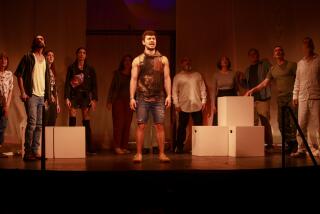Music & Dance Reviews : AIDS Cantata Premieres at UCLA
- Share via
John Corigliano’s First Symphony is proof that an important, shattering work can be inspired by the AIDS crisis. Roger Bourland’s AIDS cantata, “Hidden Legacies,” which received its premiere Sunday at Royce Hall, UCLA, does not fall into this league. But it did have an impact, if largely for reasons independent of artistic values, when sung by the Gay Men’s Chorus of Los Angeles, which had commissioned the work, under the direction of Jon Bailey.
Put 165 gay men on stage in any sincere treatment of this plague and you’re going to get a deep response, even if you don’t necessarily know that the chorus has lost nearly 70 members to the disease.
But add singers prefacing sections with personal stories (not part of John Hall’s libretto, although he helped script them), and a listener could come unglued.
When Craig Wheeler talked about the legacy of his friend Mark, the only proper response to the emotion in his voice was a convulsion of grief not usually acceptable in a public hall. When John Knoebel talked about the lesbians who cared for his friend Paul in a hospice, the human reaction would be tears of pain and gratitude.
But these were their legacies, separate from the work.
Similarly, when at the end, the whole chorus advanced toward the front of the stage in gestures of solidarity, what soul dare say no?
But artistically, the 40-minute work was a different story. Bourland acknowledged in a printed program note that Leonard Bernstein’s “West Side Story” had served as a model for the opening chorus. At least. That and pop music models could be heard throughout, if at more banal levels.
It is to his credit, however, that he could write music at all to Hall’s clumsy, unfocused libretto.
Perhaps it was just as well that so many lines were lost in the accompaniment. The chorus sang with plush tone and commitment, virtues also evident in the short works by Ron Nelson, David Goodman, John Adams, R. Murray Schafer and David Conte, which had opened the program.
More to Read
The biggest entertainment stories
Get our big stories about Hollywood, film, television, music, arts, culture and more right in your inbox as soon as they publish.
You may occasionally receive promotional content from the Los Angeles Times.










